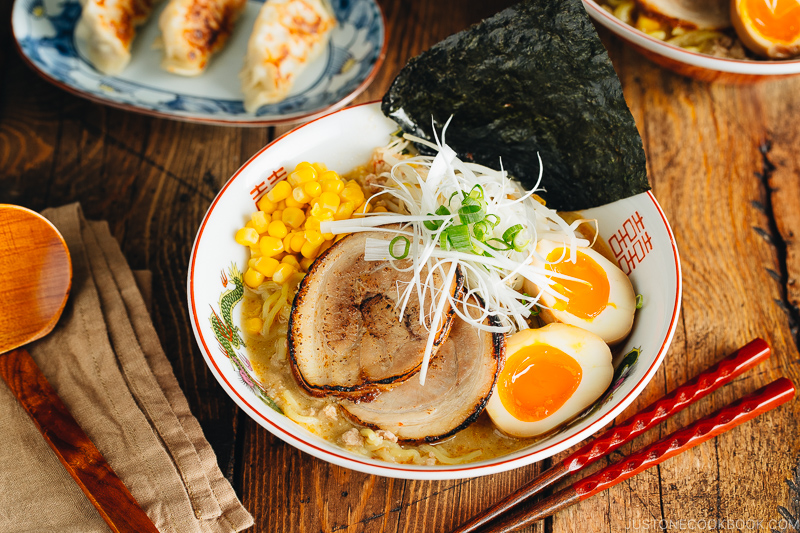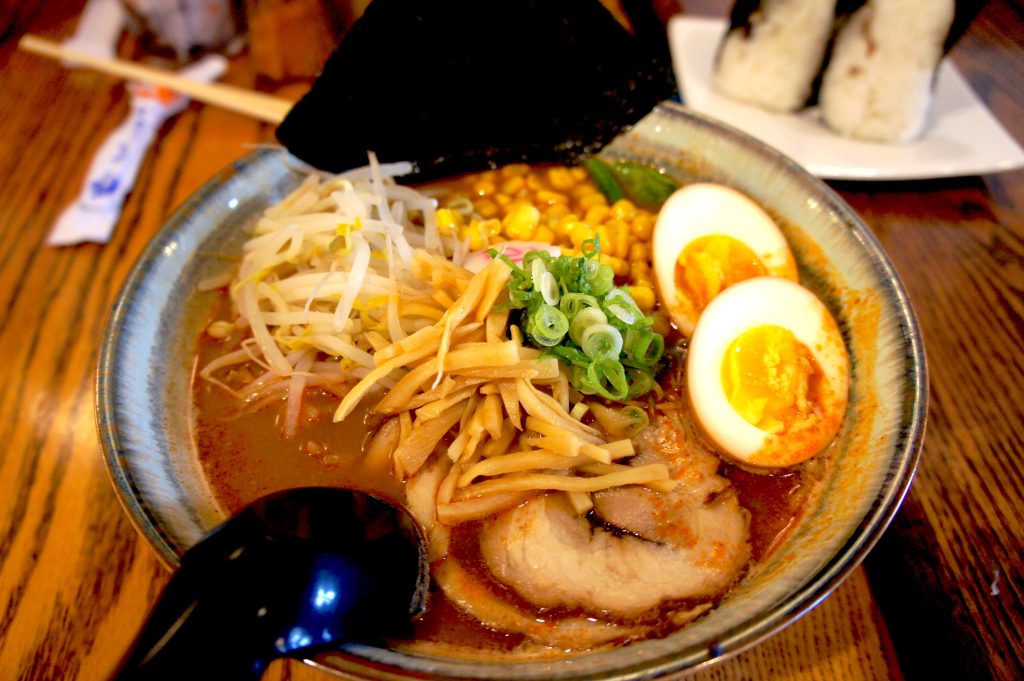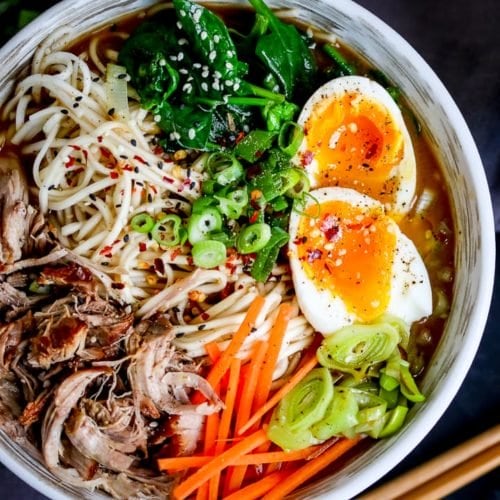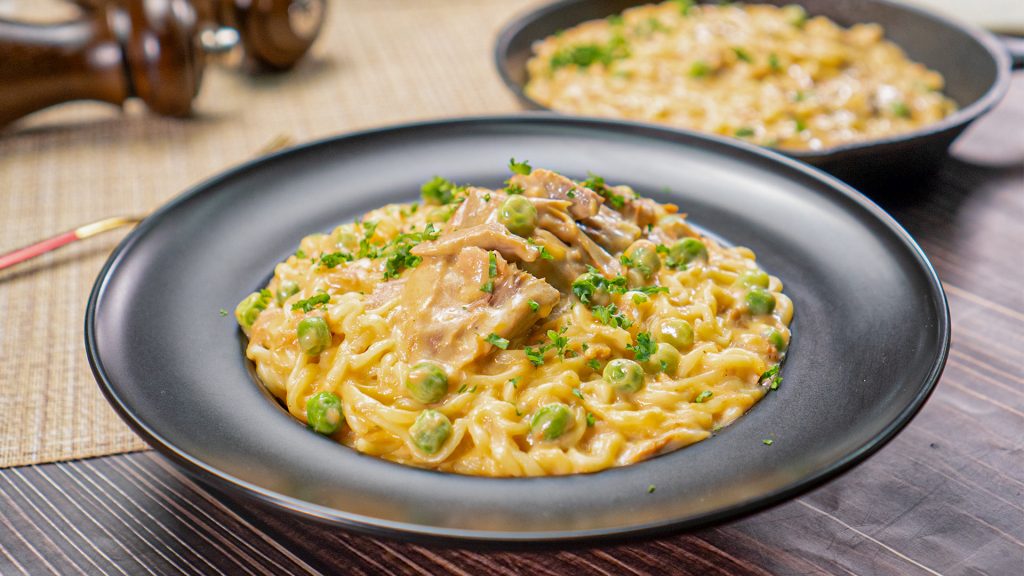Welcome to the world of Japanese culinary delight with our mouthwatering recipe for Japanese Ramen with Soft Boiled Eggs. This dish brings together the comforting and flavorful elements of traditional ramen with the velvety goodness of perfectly cooked soft boiled eggs. It’s a combination that will tantalize your taste buds and take your ramen experience to the next level.
Japanese ramen is renowned for its rich, umami-packed broth, tender noodles, and an array of delectable toppings. Soft boiled eggs, with their luscious and custard-like centers, are a popular addition to ramen bowls, adding a creamy and luxurious touch.

Japanese Ramen with Soft Boiled Eggs Recipe
Ingredients
Equipment
Method
- Boil the eggs.
- Make sure to boil the eggs for five minutes only.
- Take a large pan.
- Add the butter and let it meltdown.
- Add in the tamari paste.
- Mix all the ingredients well.
- Add the chopped garlic.
- Add in the rest of the ingredients in the end.
- Scramble the mixture.
- Add in the salt and pepper.
- Boil the ramen noodles according to the instructions on the pack.
- Drain the noodles and add them into the pan.
- Mix all the ingredients well and then dish them out.
- Peel the eggs and place it on the ramen.
- Garnish the fresh chopped chives on top.
- Your dish is ready to be served.
Video
Notes
FAQs
Q1: How do I achieve the perfect soft-boiled eggs for my Japanese ramen?
A: To achieve the perfect soft-boiled eggs, bring a pot of water to a gentle boil and carefully lower the eggs into the water. Let them cook for about 6-7 minutes, then transfer them to an ice bath to cool and stop the cooking process. This will result in a creamy and custard-like center.
Q2: Can I make the soft-boiled eggs in advance?
A: Yes, you can make the soft-boiled eggs in advance. After cooking and cooling them in the ice bath, store them in the refrigerator until you’re ready to use them. Keep in mind that the eggs are best when consumed within a day or two of cooking.
Q3: Can I use other types of eggs, such as poached or hard-boiled, in my ramen?
A: While soft-boiled eggs are traditional for Japanese ramen, you can certainly experiment with other types of eggs if you prefer. Poached eggs can provide a similar creamy texture, while hard-boiled eggs offer a firmer consistency. Feel free to try different variations and see which one you enjoy the most.
Q4: Can I customize the toppings in my Japanese ramen with soft-boiled eggs?
A: Absolutely! Ramen toppings are highly customizable. You can add a variety of ingredients such as sliced green onions, bean sprouts, corn, sliced mushrooms, bamboo shoots, or even marinated meats like chashu (braised pork). Get creative and tailor the toppings to your preferences.
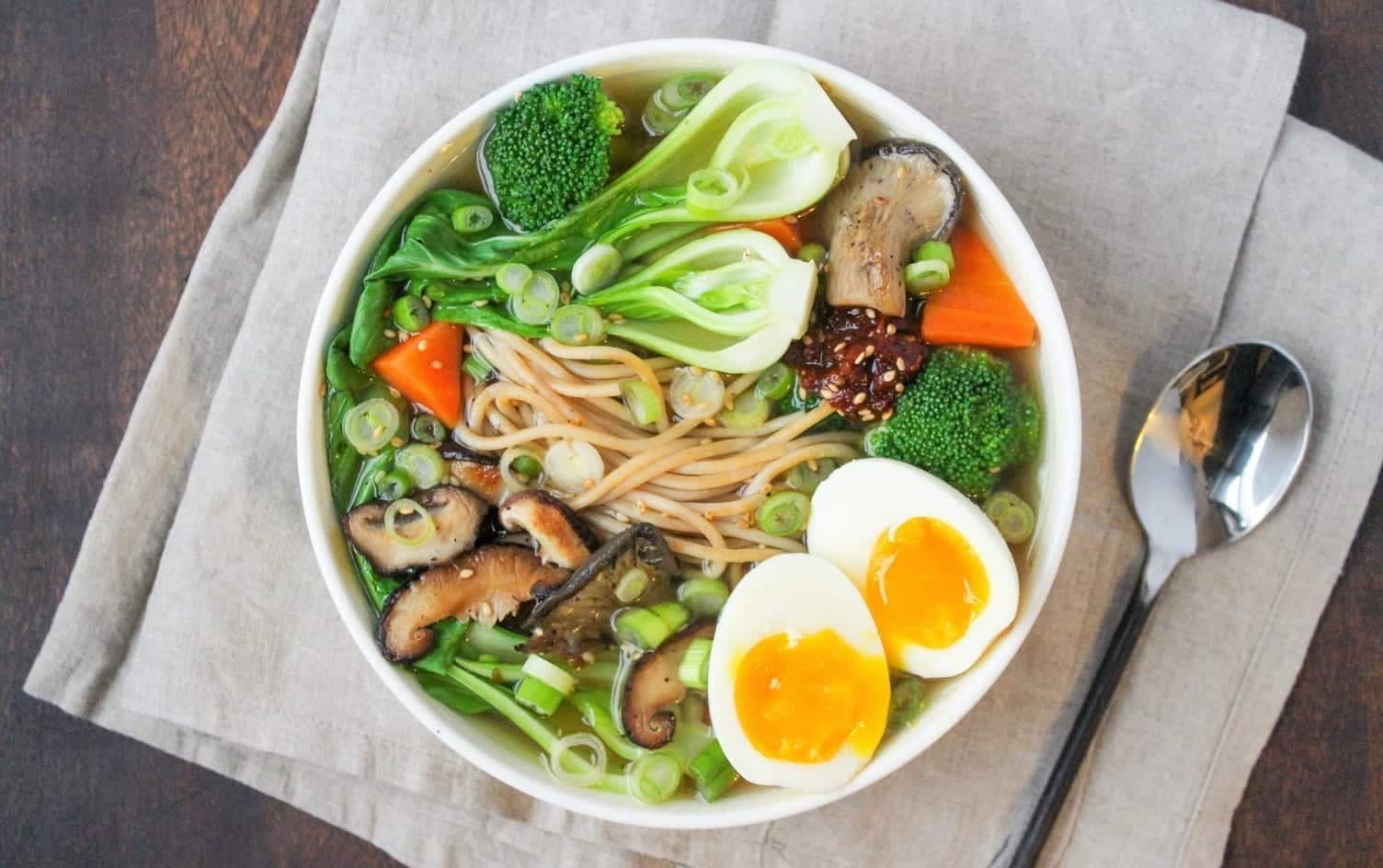
Q5: Are there vegetarian or vegan options for this recipe?
A: Yes, you can customize the recipe to suit vegetarian or vegan diets. Opt for vegetable-based broths or miso-based broths instead of meat-based ones. Use tofu or tempeh as protein alternatives, and load up on various vegetables for added flavor and texture. Substitute eggs with tofu or other vegan egg alternatives if desired.
Q6: Can I freeze the soft-boiled eggs?
A: It is not recommended to freeze soft-boiled eggs, as the texture and taste may be altered after thawing. It’s best to enjoy the soft-boiled eggs when they are freshly cooked or store them in the refrigerator for a short period of time.
Q7: Can I reheat the ramen with soft-boiled eggs?
A: It’s generally best to consume ramen immediately after assembly. However, if you have leftovers, you can reheat the broth and noodles separately. The soft-boiled eggs are delicate, so it’s best to consume them as soon as they’re cooked to retain their desired texture.
Q8: Can I use gluten-free noodles for this recipe?
A: Absolutely! If you follow a gluten-free diet, you can use gluten-free ramen noodles or substitute them with other gluten-free noodle options such as rice noodles or buckwheat noodles. Just ensure that the broth and other ingredients used are also gluten-free.
Q9: Can I make a spicy version of Japanese ramen with soft-boiled eggs?
A: Yes, you can add some heat to your ramen by incorporating spicy ingredients such as chili oil, sriracha, or red pepper flakes. Adjust the level of spiciness according to your preference and enjoy the flavorful kick it brings to your dish.
Remember, these answers serve as general guidelines. Feel free to adapt the recipe and make it
Cooking Tips
Here are some helpful tips to ensure you achieve the best results when preparing Japanese Ramen with Soft Boiled Eggs:
1. Choose the right eggs: Use fresh eggs for the best outcome. Fresh eggs have firmer whites, making them easier to handle during the soft boiling process.
2. Soft boil the eggs to perfection: To achieve a creamy and custard-like center, carefully cook the eggs in gently boiling water for around 6-7 minutes. After boiling, transfer the eggs immediately to an ice bath to stop the cooking process. This helps prevent the eggs from overcooking and ensures the desired soft consistency.
3. Peel the eggs carefully: Once the eggs have cooled in the ice bath, carefully peel them under running water or in a bowl of water. Starting from the wider end of the egg can help ease the peeling process.
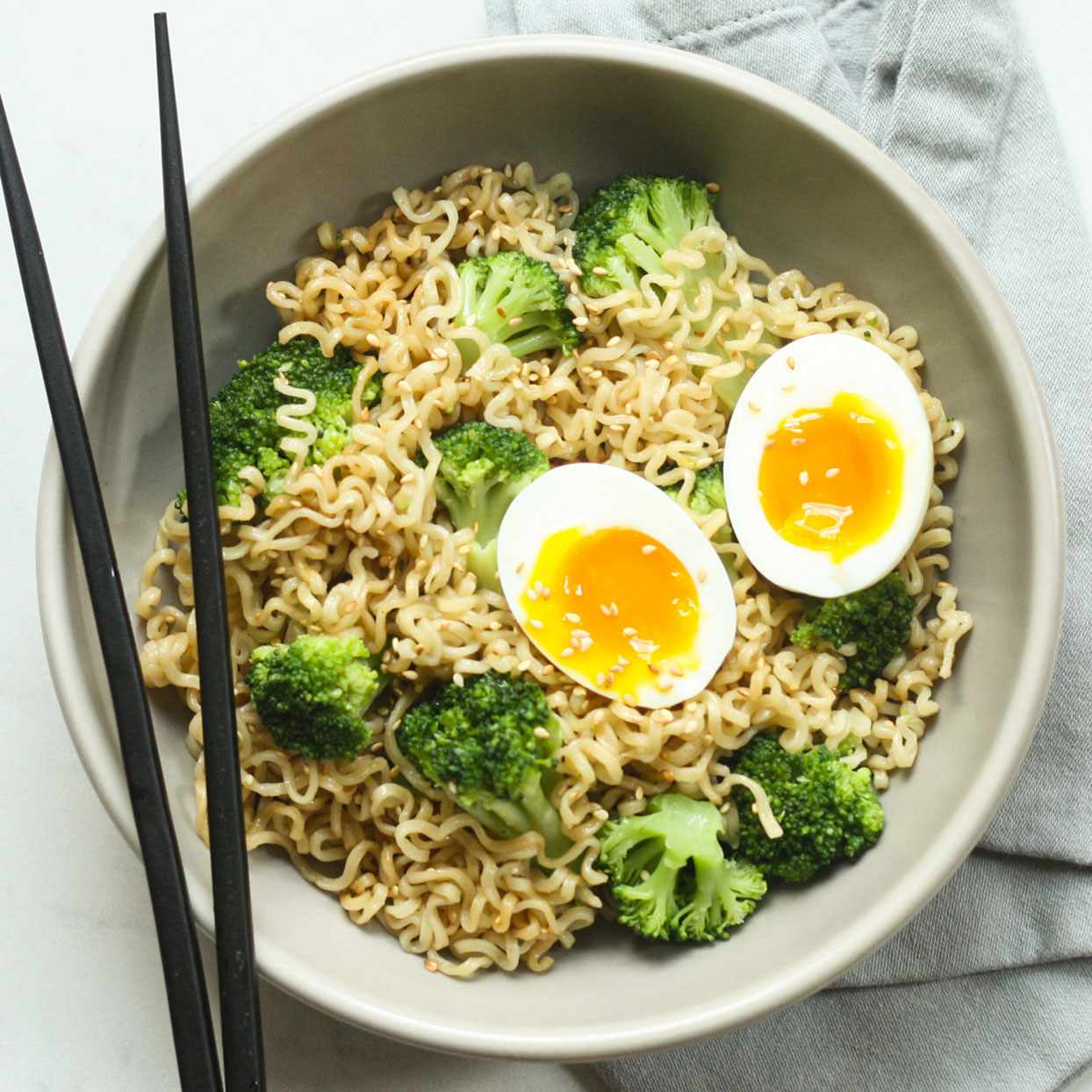
4. Marinate the eggs for extra flavor: For added depth of flavor, consider marinating the peeled soft boiled eggs in a mixture of soy sauce, mirin (sweet rice wine), and a touch of sugar. Allow the eggs to soak in the marinade for at least a couple of hours or overnight in the refrigerator. This enhances the taste of the eggs and infuses them with a delightful savory-sweet flavor.
5. Time your ramen noodles: Cook the ramen noodles according to the package instructions, usually ranging from 3 to 5 minutes. For optimal results, slightly undercook the noodles by reducing the cooking time by about 1 minute. This ensures that the noodles maintain a slightly firm texture when combined with the hot broth.
6. Assemble the ramen just before serving: It’s best to assemble the ramen bowls just before serving to ensure that the noodles are hot and the soft boiled eggs are still warm. Add the cooked noodles to the flavorful broth, arrange the toppings, and gently place the soft boiled eggs in each bowl. This way, everything comes together at the perfect temperature for a satisfying and enjoyable meal.
7. Customize with toppings: Japanese ramen offers endless possibilities for toppings. Consider adding sliced green onions, nori seaweed sheets, bamboo shoots, sliced mushrooms, or roasted sesame seeds to enhance the flavors and textures of your ramen bowl. Get creative and customize your bowl with your favorite ingredients.
By following these tips, you’ll be well-equipped to create a delicious bowl of Japanese Ramen with Soft Boiled Eggs that showcases the delicate balance between the savory broth and the velvety eggs. Enjoy the comforting warmth and rich flavors as you savor each spoonful of this delightful dish.
Serving Suggestions
Here are some serving suggestions to enhance your experience of Japanese Ramen with Soft Boiled Eggs:
1. Traditional ramen bowls: Serve the ramen in traditional ramen bowls for an authentic touch. Ladle the steaming hot broth into each bowl, then add the cooked noodles. Arrange the soft boiled eggs, sliced and placed gently on top of the noodles. Garnish with your choice of toppings such as sliced green onions, nori seaweed, and sesame seeds. The beautifully presented bowls will create an enticing visual appeal.
2. Family-style serving: Place the cooked noodles in a large serving bowl or pot, along with the flavorful broth. Arrange the soft boiled eggs on a separate plate. Set out a variety of toppings, such as sliced vegetables, mushrooms, and condiments like chili oil or soy sauce. Let everyone build their own ramen bowls, customizing their portion with their preferred ingredients.
3. Ramen bar: Create a DIY ramen bar for a fun and interactive dining experience. Set up stations with individual bowls of cooked noodles, a selection of broths (such as miso, soy sauce, or tonkotsu), and a variety of toppings and condiments. Arrange the soft boiled eggs in a separate dish. Guests can assemble their own ramen bowls, exploring different combinations of flavors and creating a personalized culinary adventure.

4. Bento box: Pack the Japanese Ramen with Soft Boiled Eggs into a bento box for a portable and convenient meal. Place the cooked noodles in one compartment and the soft boiled eggs in another. Add small containers with the broth and various toppings, allowing the recipient to assemble the ramen when ready to eat. This option is perfect for picnics or lunch on the go.
5. Side dish accompaniment: Serve the ramen as a side dish alongside other Japanese dishes. Pair it with items like gyoza (dumplings), tempura, or Japanese salads for a well-rounded meal. The ramen with soft boiled eggs can add a comforting and flavorful element to the overall dining experience.
Remember to provide chopsticks, spoons, and small plates or bowls for easy consumption. Encourage your guests to mix the soft boiled eggs into the ramen broth, allowing the rich, creamy yolk to add extra richness and flavor. Enjoy the combination of textures and flavors as you savor this delicious Japanese Ramen with Soft Boiled Eggs.


